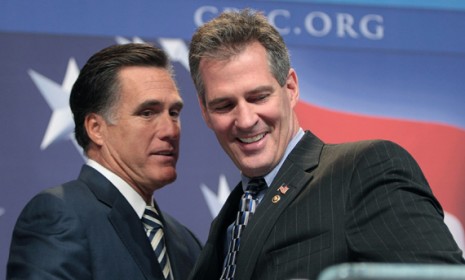4 reasons Democrats are hopeful about holding the Senate
For months, the GOP seemed to have better than even odds at seizing the Senate. Not anymore. What went wrong?

A free daily email with the biggest news stories of the day – and the best features from TheWeek.com
You are now subscribed
Your newsletter sign-up was successful
Political forecasters have long said that Republicans were strongly favored to pick up four seats in November and regain control of the Senate, where Democrats now have a slim 53-47 majority. But now, says Nate Silver at The New York Times, "polls show key races shifting decisively toward the Democrats, with the Republican position deteriorating almost by the day." Indeed, on the gambling website Intrade, the betting market gives the GOP a mere 20 percent chance of seizing the Senate — nearly the polar opposite of the figure from a couple weeks ago, when Democrats were barely given a 20 percent chance to retain their majority. What accounts for this sea change? Here, four factors lifting Democratic fortunes:
1. Romney is dragging down Republicans in key races
The GOP's hopes of seizing the Senate have "dwindled dramatically" at the precise moment that Romney's campaign has tanked, says Josh Marshall at Talking Points Memo. In Massachusetts, for example, Sen. Scott Brown, a Republican, was locked in a dead heat with Democrat Elizabeth Warren. Over the last three weeks, however, Warren has "clearly moved into the lead." Coincidence? Maybe. More likely, though, "Romney's running stumbles," which "confirm a caricature of Republicans as elitist and owned by cocooned hyper-wealth — are doing real damage to the Republican brand." Um, that's one way to look at it, if you're a Romney bashing liberal, says Paul Mirengoff at Powerline. Another is that Warren, who spoke at the convention, got a bounce like Obama, and "Brown will pull even" again as it fades.
The Week
Escape your echo chamber. Get the facts behind the news, plus analysis from multiple perspectives.

Sign up for The Week's Free Newsletters
From our morning news briefing to a weekly Good News Newsletter, get the best of The Week delivered directly to your inbox.
From our morning news briefing to a weekly Good News Newsletter, get the best of The Week delivered directly to your inbox.
2. The GOP picked several weak nominees
The GOP's Senate hopes began unraveling months ago, says Doug Mataconis at Outside the Beltway. Sen. Richard Lugar (R-Ind.) was the longest serving senator in his state's history, and a pretty safe bet to win re-election — until he was ousted in the primary by Tea Party-backed state Treasurer Richard Mourdock. Once a lost cause for Democrats, this is now a seat they can actually win. Sen. Olympia Snowe, another Republican too moderate to suit the base, decided to retire, dimming the GOP's prospects of holding her seat. And don't forgot Todd Akin, who won a three-way primary in Missouri because he was the most conservative, then promptly sabotaged his own campaign by making his "idiotic comments about rape," virtually assuring the once-vulnerable Sen. Claire McCaskill (D) a second term.
3. Far-right candidates are hurting the party's brand
Akin didn't just hurt himself with his inflammatory remarks, says Silver. He also likely damaged the whole party's reputation by reinforcing the perception that the GOP is too conservative on social issues for mainstream tastes. Maybe that's why "more moderate Republican candidates" like Scott Brown and Connecticut's Linda McMahon "have increasingly sought to distance themselves from the national Republican brand."
A free daily email with the biggest news stories of the day – and the best features from TheWeek.com
4. There aren't enough vulnerable Dems... but wait until 2014
The GOP had a few legitimate shots at pick-ups this year, says Aaron Blake at The Washington Post, but after Akin's implosion, polling shifts in Massachusetts, Virginia, and Wisconsin were enough to dim their hopes. Still, Republicans shouldn't get too discouraged. If they "don't pull it off in 2012, watch out in 2014." Twenty Democrats will face re-election in two years — and six are from red states, with another six in hard-fought swing states. And they can't count on having many Republicans go down in flames to even the math. Only 13 GOP senators will be on the spot, and all but one are sitting in the safety of red states. The map was tough for Dems this year, but "it's murderous in 2014."